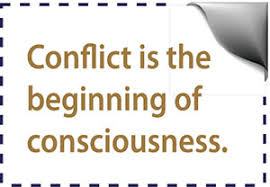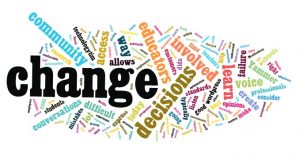With instant access to information at our fingertips, it can easily feel that the world is falling apart. The field of peacebuilding and conflict resolution does not always bring to mind images of positivity. Sometimes it makes us wonder if human beings are inherently evil, if constant turmoil is the only way, and if it is even possible to address some of the most pressing but complex issues involving war and deep divisions. Each day in SPP, we discuss human rights abuses, inequality, challenges of race relations, and the breadth of forms of violence that exist in our societies. There seemingly innumerable very real challenges and wickedly complicated problems. Despite this, I have found many reasons to be hopeful in each class. We are shown examples of individuals and groups doing amazing work to improve our societies and open up difficult conversations that we must have. There is reason to be positive in relation to the field of peacebuilding. I want to share some of the messages from each day that show there is reason to be optimistic.

Day #1 – Conflict is good!
Great! … there is no shortage of conflicts, despite the fact that we are living in the most peaceful time in human history. Without any conflict, there is no space to demand a transformation, which will ultimately shake up the status quo. It is all about how conflict is managed. We must become comfortable with conflict and it’s essential role.
Day #2 – Nonviolent civil resistance and social movements are the way to make a change
Inequality is reaching staggering levels in the United States, but we are not alone in this challenge. It is a result of specific policy decisions, but these policies can be influenced by social movements. When nonviolent movements reach a critical mass, it does result in changes. Movements that demand dignity and equal humanity are long and slow processes, but mobilizing behind a cause has a real ability to achieve objectives.

Day #3 – In every situation, there are always people building peace
Even in the areas of the world that are most wrought with war and conflict, there are local people working on creating peace. Peacebuilding from within affected communities allows for local peacebuilders to work on the micro and macro tensions that an outside actor cannot effectively address. Nations and organizations that fund peacebuilding must invest in their efforts, and trust local understanding of the situations they are seeking to ameliorate.
Day #4 – All religions speak about compassion and giving to others
There is a common perception that religion is a principle driver of conflict, and new fears are arising in today’s day and age about those that are seen as ‘different’. We can break down these incorrect perceptions. Building friendships with those of a spectrum of cultural, religious, and racial backgrounds will contribute to a greater ability to be more accepting and caring of all humans, and support those that are suffering as opposed to ostracizing them.
Day #5 – It is absence of knowledge that leads to suspicion
Dialogue can be utilized to address particular concerns through the process of joint knowledge sharing and creation, therefore it can ultimately work to diminish suspicion. It can also serve to value everyone’s contribution, while recognizing and hearing voices that have been previously strategically minimized. It is a powerful tool for creating a more integrated community, when there is space and a readiness to engage with a spectrum of ideas.
Day #6 – Political changes are happening to be ‘smart on crime’
From the 1980’s to the early 2000’s, a shift in policies largely related to the war on drugs led to a booming prison population, which disproportionately impacted communities of color. The perspective was that politicians must be tough on crime, and there is nothing to gain by being progressive in this area. We became the nation that locks up the greatest percentage of minorities, and 1 in 15 African American males are incarcerated. Today, there are shifts away from the view that the punitive response is the only option, as there is a movement underway working on bipartisan criminal reform.

Day #7 – Prevention is the answer to breaking the prison system
We saw that within the incarceration system, individuals are incredibly resilient and frequently want to engage in the journey of deep personal change. However, a prison cannot and should not be the place that is expected to transform a system – that needs to be done before individuals arrive. If we offer the next generation a quality education, equal opportunity, and show young people a narrative that they do belong in society and not in gangs – the incarcerated community will eventually age out. We need to build a system that teaches young people to envision and enact a life for themselves with greater possibility.

Day #8 – It is a time of transformation for law enforcement
In the small city of Salinas, there is a cultural shift occurring within the law enforcement community. It is also reflective of transitions happening across the country in how we view the role of police. The Salinas Police Department is reconsidering what effective policing looks like. We learned about the prioritization of building community and police relations in order to more effectively serve community interests and safety. The PD wants the face of law enforcement to be relatable, and spend time with communities that are marginalized. Like any transition, it is not a quick or easy process, but one that is essential.
Day #9 – Historians have a social responsibility, and can change ideas about justice
Most conflicts throughout the world are driven by history and memory in some aspect, whether it is in colonial roots, the systematic distortion of a group’s identity, or historically engrained inequalities. History and memory can be used as tools for creating peace. Recognizing history from a broader perspective than that of the elites is an important moral aspect of acknowledgement and truth telling, and one that can serve to ultimately build a more peaceful society.

Day #10 — If you are confused, you are learning!
It is essential to remember that in this field, those that think they have THE answer are part of the problem and not a solution. A sense of confusion is an indication of an understanding of the complexity the world, societies, issues, and individuals. This is a refreshing reminder, because I feel that I have gained an immense amount of knowledge and insight in these past two weeks, and also that my head is spinning…apparently it is sign of how much we are learning.

